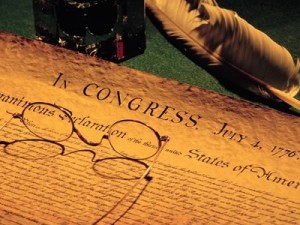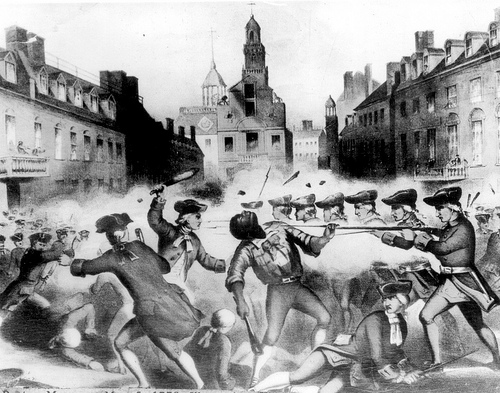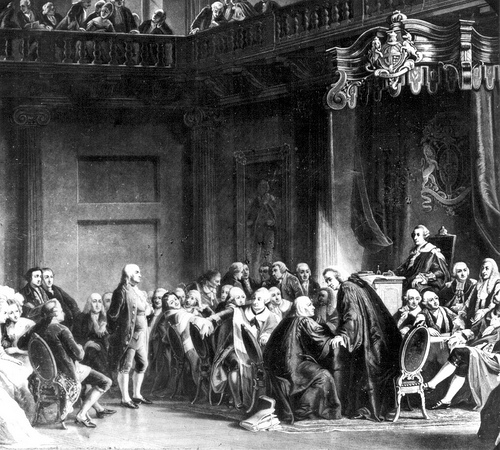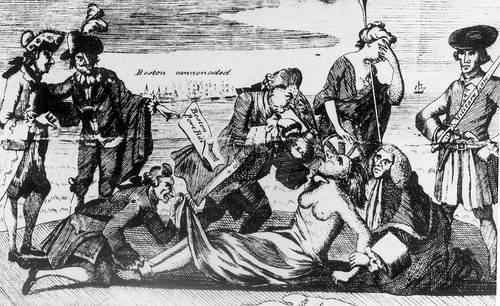It seemed a natural extension of the type of learning we put to use in class every day: research and communication, collaboration and presentation.
In encountering the context of the American Revolution, and interpreting not only the Founding Fathers’ possible intentions in creating the Declaration of Independance as a political document, but also a living document, and record of human progress, the class wrote a series of their own Declarations of Independent Learning.
A common theme that arose in these statements of purpose was the opportunity for TALONS learners to document, record, and showcase their learning for posterity, their peers, and the extended audiences of their blogs. In assessing the amount of the course content absorbed, and creating an opportunity for an individual synthesis project on a finite timeline, we set out to redefine the history test: an open-computer, Google-able, tes- errr… Showcase of Learning.
At nine in the morning last Thursday, with a blanket of wet snow covering the Lower Mainland – leaving one student to ‘telecommute,’ and complete the test from home – I shared a Google document with the criteria supplied below. They were able to communicate via the chat feature on the document, and in other ways that could be shared publically (Etherpad, or otherwise – no Facebook chat); talking to group mates, and other people in the class was permitted, so long as it didn’t interfere with anyone else’s ability to work productively (another common theme in many Declarations of Learning).
On laptops, with textbooks, and pre-prepared notes, the class had seventy-five minutes to make use of any resource they could muster in responding to one of the quotes, cartoons, or critiques below.
Talons Learners have the right to showcase their learning
TALONS Constitution, written into law November 2010
Intellectuals are in a position to expose the lies of governments, to analyze actions according to their causes and motives and often hidden intentions. In the Western World, at least, they have the power that comes from political liberty, from access to information and freedom of expression. For a privileged minority, Western democracy provides the leisure, the facilities, and the training to seek the truth lying behind the veil of distortion and misrepresentation, ideology and class interest through which the events of current history are presented to us.
Noam Chomsky – The Responsibility of Intellectuals (1966)
Respond to one of the statements below to demonstrate an understanding of the colonial context of the period (conditions leading up to the revolution), an introduction to the source of the quotation, and connection to our present understanding of history, and current events.
Your response may be in the form of a blog post, Prezi, Slideshow, or other animation that must be linked or posted on your blog, and must include the following:
- Title: a statement of purpose, or thesis
- Links to at least two of your classmates’ blog posts about the American Revolution, or the nature of Learning Rights
- Links to three outside sources
- Two quotations (from either of the above)
- An image (to ensure Nick will read the results)
Select one of the following artifacts, reflections, representations or quotations on the American Revolution for discussion and presentation.
Examples of Talons’ responses can be viewed on the exemplar page of the class’ Socials Wiki.
The rubric below was also attached for reference.
(originally by Paul Revere)
- “History affords us many instances of the ruin of states, by the prosecution of measures ill suited to the temper and genius of their people. The ordaining of laws in favor of one part of the nation, to the prejudice and oppression of another, is certainly.”
Benjamin Franklin
- “We have here a forecast of the long history of American politics, the mobilization of lower-class energy by upper-class politicians, for their own purposes. This was not purely deception; it involved, in part, a genuine recognition of lower-class grievances, which helps to account for its effectiveness as a tactic over the centuries.”
Howard Zinn
Benjamin Franklin at St. James Court
- “They that can give up essential liberty to purchase a little temporary safety, deserve neither liberty nor safety.”
Ben Franklin
- “The United States has in itself no character of enmity against the laws, religion or tranquility of Muslims.”
John Adams
- “The truth is that all men having power ought to be mistrusted.”
James Madison
The able doctor, America, swallowing the bitter draught
- “If Tyranny and Oppression come to this land, it will be in the guise of fighting a foreign enemy.”
James Madison
- “No more, America, in mournful strain, Of wrongs and grievance unredressed complain; No longer shall thou dread the iron chain Which wanton Tyranny, with lawless hand, Had made, and with it meant t’ enslave the land.”
Phyllis Wheatley
- “It does not require a majority to prevail but rather an irate, tireless minority keen to set bush fires in people’s minds.”
Samuel Adams
|
Exceeds Expectations |
Meets Expectations |
Barely Meets Expectations |
|
|
|
Colonial Context |
Response provides engaging and well-supported context to relate significance of historical figures and events. | Response provides adequate context to relate significance of historical figures and events, but may lack specific detail and authoritative support. | Response attempts to provide context and relate the significance of historical figures and events, but may contain flaws in logic, or lack supporting detail. | |
|
Source of the Quotation |
Response introduces author or source and is able to compellingly relation their bias and perspective to revolutionary and modern events. | Response introduces author or source and is is able to relate their bias and perspective to revolutionary and modern events. | Response may attempt to introduce author or source, but does not clearly relate bias or perspective to revolutionary or modern events. | |
|
Connection to Modern Politics or Current Events |
Response draws multi-faceted connections to modern history and/or politics, and demonstrates a unique correlation between past and present. | Response draws connections to modern history and/or politics, but may not demonstrate a unique correlation between past and present. | Response attempts to draw connections to modern history andor politics, but may not demonstrate a unique correlation between past and present. |




One thought on “Talons’ Showcase of Learning: American Revolution”
Comments are closed.